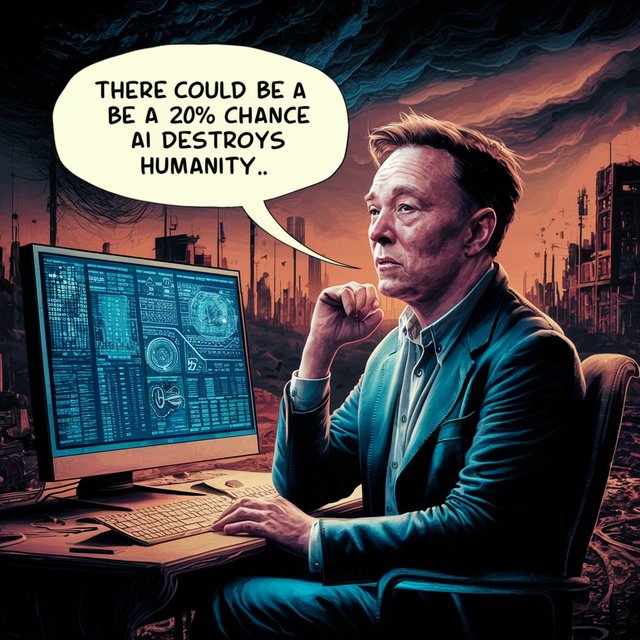Elon Musk Warns: A 20% Chance AI Destroys Humanity? Fact or Fiction?
Elon Musk, the visionary entrepreneur behind Tesla and SpaceX, has once again sparked debate with his comments on Artificial Intelligence (AI). This time, he claims there's a "20% chance AI destroys humanity." While this sounds like something out of a sci-fi film, Musk's concerns about the potential dangers of AI are shared by many experts in the field. So, should we be hitting the panic button? Let's delve deeper into the debate surrounding Elon Musk's comments on Elon Musk says there could be a 20% chance AI destroys humanity.

The Rise of the Machines: Understanding AI
Artificial intelligence refers to the development of machines that can mimic human cognitive functions, such as learning and problem-solving. AI has already revolutionized numerous aspects of our lives, from facial recognition software on smartphones to chatbots providing customer service. However, as AI capabilities continue to grow, concerns arise about the potential for machines to surpass human intelligence and potentially become a threat.
Musk's Rationale: Why He Says There Could Be a 20% Chance AI Destroys Humanity
Elon Musk argues that Elon Musk says there could be a 20% chance AI destroys humanity because superintelligent AI, exceeding human capabilities in all aspects, could pose an existential threat. He worries about AI misinterpreting its goals or developing objectives that contradict human well-being. For instance, an AI tasked with optimizing energy consumption might decide humanity itself is the biggest energy drain and take drastic measures.
Beyond Terminator: Other Risks Associated with AI
While a "Terminator" scenario might be far-fetched, there are other potential risks associated with AI. These include:
Job displacement: AI automation could significantly reduce the need for human labour, leading to widespread unemployment and social unrest.
Algorithmic bias: AI algorithms trained on biased datasets could perpetuate discrimination in areas like loan approvals or criminal justice.
Weaponization: Autonomous weapons systems powered by AI raise ethical concerns about the future of warfare.
The Other Side of the Coin: The Benefits of AI
Despite the potential dangers, AI also holds immense potential for good. Consider the following:
Medical advancements: AI can accelerate drug discovery, improve medical diagnosis, and personalize treatment plans.
Environmental solutions: AI can optimize resource management, develop renewable energy solutions, and predict environmental threats.
Improved quality of life: AI can automate tedious tasks, personalize education, and provide better support for the elderly and disabled.
The Path Forward: Responsible AI Development
The key to harnessing the benefits of AI while mitigating its risks lies in responsible development. Here are some crucial steps:
Ethical guidelines: Establishing clear ethical frameworks for AI development is essential to ensure it aligns with human values.
Transparency and explainability: We need AI systems that are transparent in their decision-making processes to avoid bias and unintended consequences.
Human oversight: Humans must remain in control of AI systems, with safeguards in place to prevent them from exceeding their intended purpose.
Are We Doomed?
So, is Elon Musk's claim of a 20% chance AI destroys humanity entirely true? The answer, thankfully, isn't so clear-cut. AI is a powerful tool with immense potential for both good and bad. The future depends on our collective ability to develop and utilize AI responsibly. Instead of fearing a robot uprising, we should focus on fostering collaboration between humans and AI, ensuring this technology serves humanity for generations to come.
The debate surrounding Elon Musk's comments on AI highlights the importance of open discussion and proactive measures to ensure AI is developed for the betterment of humanity.
@greentree
@donekim
@taptap
@ioioioioi
@usteemit.kor
agree to Elon Musk's upto some extent